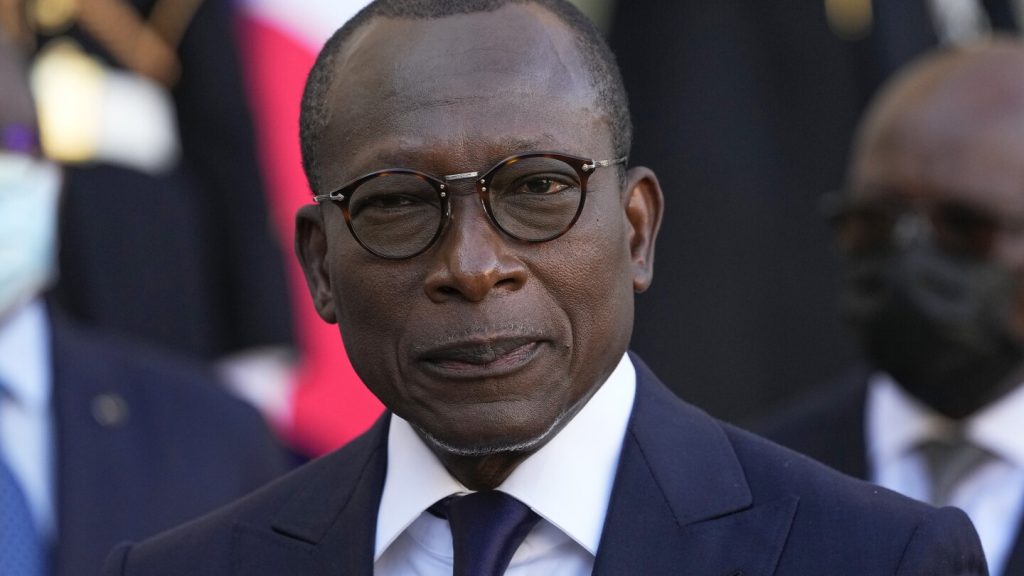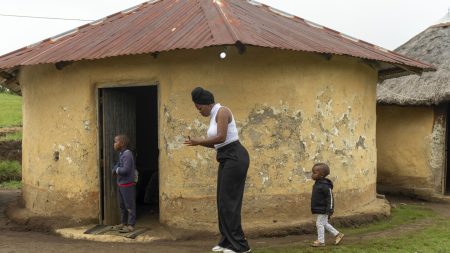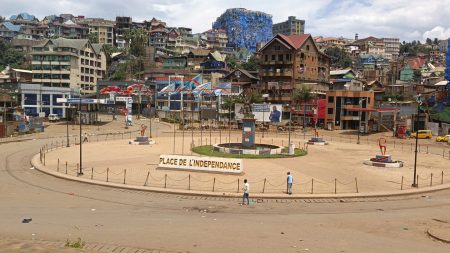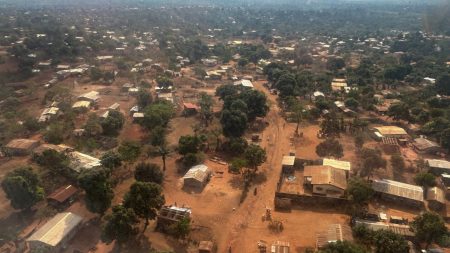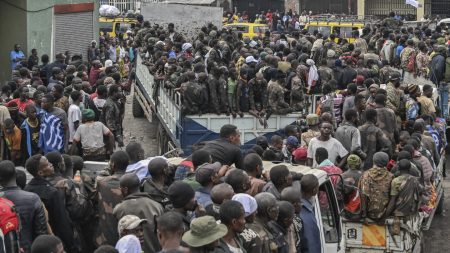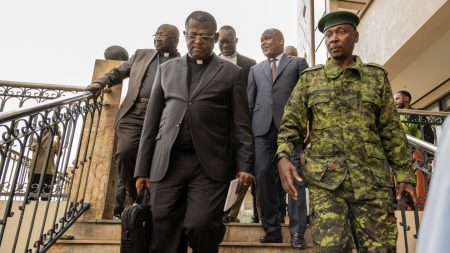High-Stakes Drama Unfolds in Benin as Presidential Associates Face 20-Year Sentences
In a dramatic turn of events that has sent shockwaves through the small West African nation of Benin, two close associates of President Patrice Talon have been handed hefty 20-year prison sentences. Olivier Boko, a wealthy businessman and longtime confidant of the president, and Oswald Homeky, a former sports minister, were found guilty of “conspiracy against state security” and “corruption of a public official.” The verdict, delivered by a specialized court in the capital city of Cotonou, marks a significant escalation in a case that has captivated the nation and raised questions about the stability of Benin’s democracy.
The story began unfolding in September of last year, when Boko and Homeky were arrested on suspicion of masterminding a coup plot. Prosecutors alleged that the two men had bribed the commander of the presidential guard, Col. Djimon Dieudonne Tevoedjre, to overthrow President Talon. The evidence presented in court included charges that Homeky was caught in the act of handing over six bags of money to the colonel. The prosecution, led by Special Prosecutor Elonm Mario Metonou, painted a picture of a carefully orchestrated plan to destabilize the government, with Boko reportedly acting as the mastermind behind the scenes. A third defendant, Rock Nieri—Boko’s brother-in-law and a fugitive—was also sentenced in absentia on the same charges.
A Trial Shrouded in Controversy and Suspicion
The trial itself was not without controversy, as the defense team withdrew from the proceedings in protest of the court’s composition. This move by the lawyers added fuel to the fire of accusations that the judicial system in Benin is being weaponized by the Talon administration to silence political opponents. Critics argue that the case against Boko and Homeky is part of a broader pattern of authoritarianism, with President Talon allegedly using the courts to consolidate power and eliminate potential rivals.
The severity of the sentences—20 years in prison, along with a staggering 60 billion CFA francs ($95 million) in damages to the state—has further ignited debate. Both men were also slapped with individual fines of 4.5 billion CFA francs ($6.8 million) each. The financial penalties are particularly striking, given that corruption charges were central to the case. While the prosecution maintained that the punishments were commensurate with the gravity of the crimes, critics view the sentences as disproportionate and politically motivated.
The Larger Political Landscape: A Democracy Under Strain
Benin, once hailed as a beacon of democracy in Africa, has seen its political landscape shift dramatically since President Talon came to power in 2016. Initially praised for his economic reforms, Talon has increasingly faced criticism for his consolidation of power. In 2021, changes to electoral laws were enacted, which opponents claim were designed to limit political competition. Talon’s decision not to seek a third term in 2026, as per the constitution, has done little to quell concerns about the erosion of democratic norms.
The case of Boko and Homeky has only deepened these anxieties. Both men were well-connected figures in Beninese politics, with Boko, in particular, being seen as a potential presidential candidate for the 2026 elections. While Boko himself never publicly expressed interest in running, his reputation as Talon’s “right-hand man” and his influence in political circles made him a formidable figure. The sentencing has been interpreted by many as a strategic move to neutralize a potential challenger, further entrenching Talon’s grip on power.
The Human Cost of Political Power Plays
Beyond the political intrigue, the case has real human implications. The lengthy prison sentences handed down to Boko and Homeky will likely have a profound impact on their families and loved ones. The financial penalties, while intended to serve as a deterrent, may also have far-reaching consequences for their associates and business partners. The absence of Rock Nieri, who remains at large, adds another layer of uncertainty to the situation, leaving many to wonder about his whereabouts and the fate that awaits him if he is captured.
The withdrawal of the defense team from the trial has also raised concerns about the fairness of the proceedings. The legal community in Benin and beyond will be closely watching how this case is handled in the coming months, particularly if appeals are filed. The international community, including human rights organizations, has been vocal in its criticism of the Talon administration’s handling of political dissent, and this case is likely to become a focal point in those discussions.
A Nation at a Crossroads: The Road Ahead for Benin
As Benin approaches the 2026 presidential elections, the sentencing of Boko and Homeky serves as a stark reminder of the high stakes involved in the country’s political landscape. The government’s crackdown on perceived threats to its authority has set off alarms about the future of democracy in a nation once celebrated for its stability and openness.
The international community will be watching closely to see how Benin navigates this critical juncture. Will the Talon administration continue down a path of consolidation and control, or will it take steps to address the growing concerns about democratic backsliding? The answers to these questions will not only shape the fate of those currently in prison but also determine the trajectory of Benin’s political future.
For now, the case of Boko and Homeky stands as a symbol of the delicate balance between power and justice in a nation grappling with the challenges of maintaining its democratic ideals. As the dust settles on this high-profile trial, one thing is clear: the road ahead for Benin will be fraught with challenges, and the choices made by its leaders will have lasting implications for the nation and its people.





